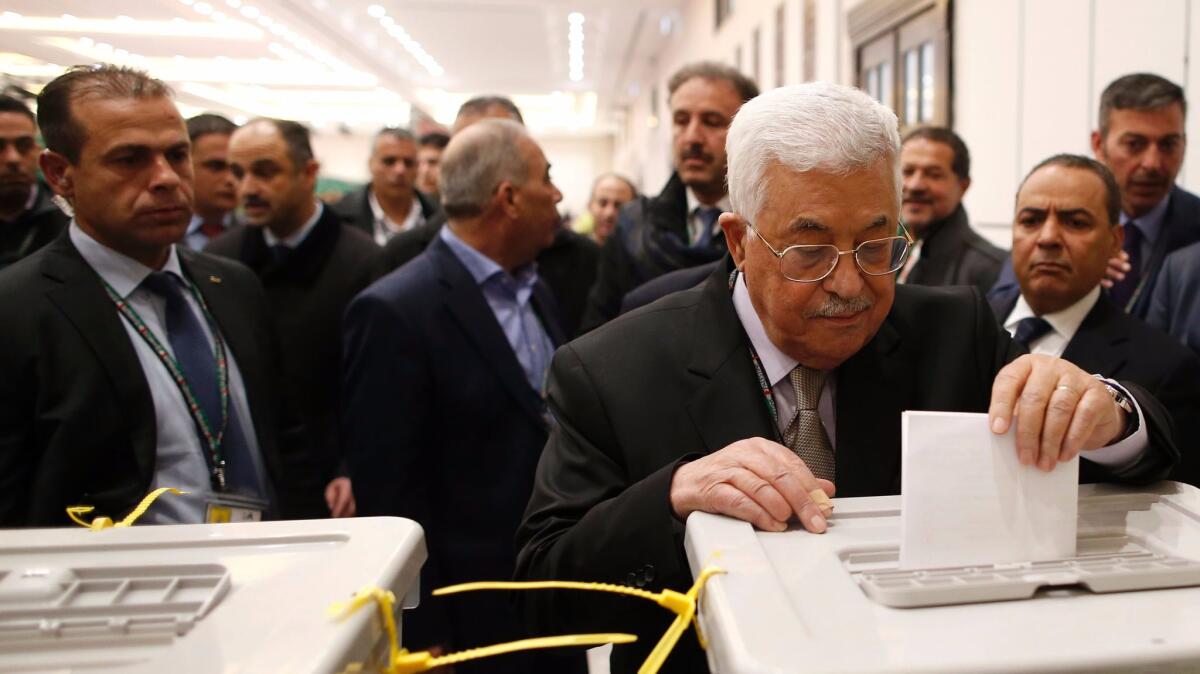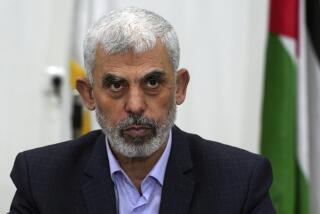Palestinian Authority leader Mahmoud Abbas consolidates control over his party

- Share via
Reporting from TEL AVIV — Palestinian Authority President Mahmoud Abbas cemented his control over his political party, Fatah, on Sunday after 18 politicians loyal to him won spots on its powerful Central Committee. The vote capped a six-day conference of the party, which also saw a former West Bank security chief receive a boost as a potential successor to Abbas.
“The president after this conference is stronger than before. He has new legitimacy inside Fatah for his leadership,” said Ghassan Khatib, a former spokesman for the Palestinian Authority. “There are no challenges inside this new elected body. On the other hand, it will maintain the gap between the Fatah leadership and the public.”
The gathering also helped deepen a rift within Fatah, as a minority group of dissenters — many of them supporters of Mohammed Dahlan, a former Gaza Strip security chief who lives in the United Arab Emirates after being expelled from Fatah — say they were shut out of the proceedings.
About 1,400 Fatah delegates voted in the election; Abbas had broad control over who made it onto the list of delegates.
“We can’t consider this a legitimate conference,” said Dimitri Diliani, a former member of the party’s Revolutionary Council, who said that he was dropped from list. Abbas, he said, “wants a guaranteed outcome that would allow him to continue is governing style, which we consider an autocracy.”
Some Palestinian observers noted that the average age of 64 among the Central Committee winners would make it more challenging for Fatah to appeal to younger Palestinians.
Reacting to the results, Diana Buttu, a former member of the Palestinian negotiating team, wrote on Twitter that the vote “#DoesNotRepresentMe” because the winners were largely older and male: Only one of the newly elected members is a woman.
The gathering comes at a time when Palestinians, and observers in the Middle East more broadly, are anxiously looking for signs of who will succeed the 81-year-old Abbas. Domestic public opinion favors a new leader for the Palestinian Authority. Despite expectations among some Palestinians that the Fatah gathering might appoint a party leader to be Abbas’ deputy, none was named.
In a symbolic show of support, Marwan Barghouti, who is serving consecutive life sentences in an Israeli jail for deadly attacks on Israelis and foreigners during the Palestinian uprising in the early 2000s, finished first in the voting for the Fatah Central Committee.
Jibril Rajoub, a former West Bank security chief who heads the Palestinian soccer federation, came in second, elevating his standing as a potential heir to Abbas within Fatah.
Abbas, who last faced a vote among all Palestinian residents of the West Bank and the Gaza Strip in 2005, has been struggling because the peace talks he has supported with Israel have been mothballed for years, and he has failed to make progress establishing a state in the Palestinian territories.
At home, Abbas has faced riots in West Bank refugee camps by former Fatah militants who say they’ve been neglected by the Palestinian Authority. He came under pressure from some Arab states before the conference to mend fences with Dahlan.
The results of the conference are also a challenge to those Arab states, such as the United Arab Emirates, which has been backing Dahlan.
“The rift is now solidified in the party,” Grant Rumley, a research fellow at the Foundation for Defense of Democracies, a Washington think tank on foreign and security policy. “The only question is what the dissidents will do now: Will they try to lash out violently, or sue for peace, or start a rival party.”
Mitnick is a special correspondent.
More to Read
Sign up for Essential California
The most important California stories and recommendations in your inbox every morning.
You may occasionally receive promotional content from the Los Angeles Times.










